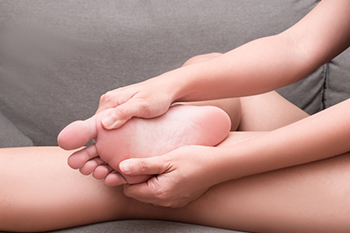
Sesamoiditis is an inflammation of the sesamoid bones under the big toe, causing pain in the ball of the foot. Common among dancers, runners, and those who place repeated pressure on their forefoot, it is assessed through patient history, including activity level and recent foot strain. A podiatrist may recreate symptoms by pressing on the sesamoid area to pinpoint pain, and they will look for biomechanical factors like high arches or gait issues that can contribute. Imaging may help rule out fractures or other causes of pain. Treatment focuses on relieving pressure and inflammation through rest and cushioned pads or orthotics to offload the area. If you have persistent pain under your big toe, it is suggested that you schedule an appointment with a podiatrist for a proper diagnosis and treatment, which may include steroid injections or surgery.
Sesamoiditis is an unpleasant foot condition characterized by pain in the balls of the feet. If you think you’re struggling with sesamoiditis, contact one of our podiatrists of Pocono Foot & Ankle Consultants. our doctors will treat your condition thoroughly and effectively.
Sesamoiditis
Sesamoiditis is a condition of the foot that affects the ball of the foot. It is more common in younger people than it is in older people. It can also occur with people who have begun a new exercise program, since their bodies are adjusting to the new physical regimen. Pain may also be caused by the inflammation of tendons surrounding the bones. It is important to seek treatment in its early stages because if you ignore the pain, this condition can lead to more serious problems such as severe irritation and bone fractures.
Causes of Sesamoiditis
- Sudden increase in activity
- Increase in physically strenuous movement without a proper warm up or build up
- Foot structure: those who have smaller, bonier feet or those with a high arch may be more susceptible
Treatment for sesamoiditis is non-invasive and simple. Doctors may recommend a strict rest period where the patient forgoes most physical activity. This will help give the patient time to heal their feet through limited activity. For serious cases, it is best to speak with your doctor to determine a treatment option that will help your specific needs.
If you have any questions please feel free to contact our offices located in Stroudsburg, Nazareth, and Easton, PA . We offer the newest diagnostic and treatment technologies for all your foot and ankle needs.
